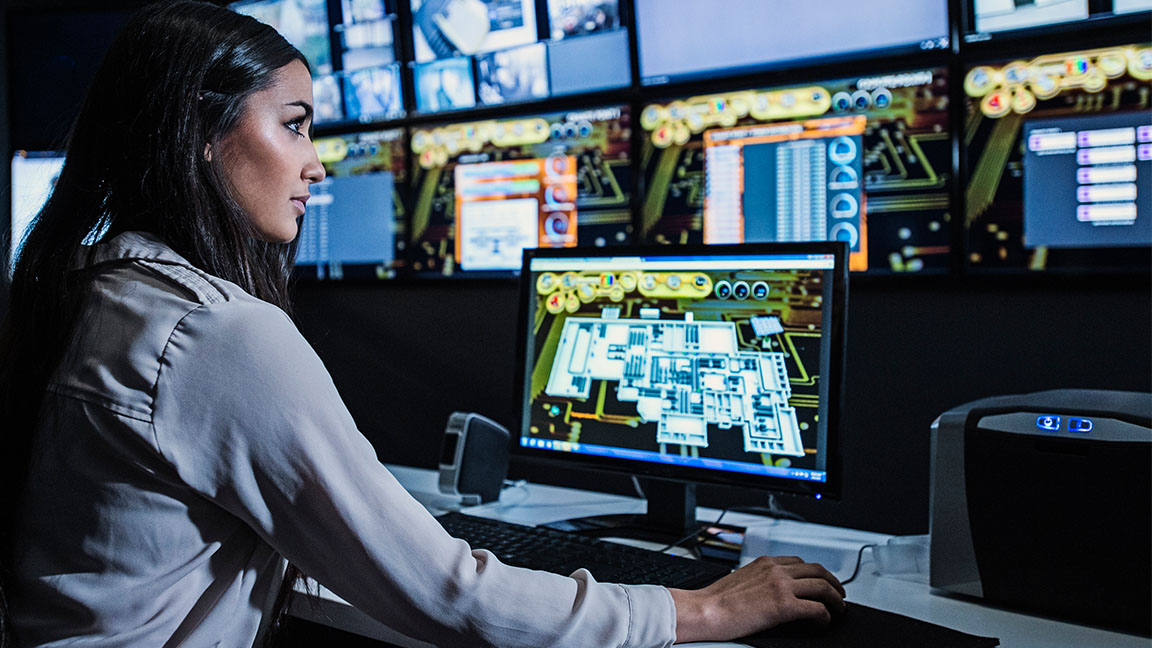In modern command and control environments, where staff are tasked with monitoring and managing increasing numbers of sources and systems, optimized visualization and efficient communication are critical contributors to real-time decision making. With the right technology and solutions, organizations can address these requirements effectively, realizing valuable efficiencies that translate to greater productivity, more effective collaboration, and enhanced responsiveness.
[Download Today: The Integration Guide to KVM]
AV-over-IP technology has emerged as a principal enabler of efficiency in command and control because it allows organizations to extend, distribute, and control ultra-high-resolution video and audio over IP to a virtually unlimited number of screens across their existing local area networks (LANs). At the same time, robust IP-based KVM (keyboard, video, mouse) systems enable staff to access remote systems—from one to more than a dozen—with flexibility.
With just one keyboard, mouse, and monitor setup, individual users can access multiple systems simultaneously and switch instantly between them. Switching between systems occurs in the background, without manual switching commands or the technical know-how they require, so users can stay focused on their work.

Simplifying management of both IT-based and traditional AV systems, KVM-over-IP systems make it easier for organizations to scale up connectivity and connect to new sources as needed. With virtually every new system and source connecting over IP, organizations can quickly extend their remote access and monitoring capabilities. Because the IP network supporting signal extension is built for reliability and security, administrators and users enjoy minimal downtime, as well as confidence that data transferred over the KVM network is protected from unauthorized access.
[How to Collaborate on Collaboration]
When collaboration among control room operators is a must, organizations can realize greater efficiency by facilitating fast, easy sharing of important systems on a common display. If a single team member can instantly share a problematic source with the larger group, the full team can work together more effectively to identify and resolve any issues. Real-time sharing and review of information on a shared video wall can be essential to timely group coordination and response.
When the KVM system supports this capability, delivering the appropriate signal directly to a video wall without the need for additional encoders or decoders, the organization can enable more rapid team problem-solving without incurring added costs, adding complexity, or increasing administrative requirements. Initial integration of the system remains straightforward, as do day-to-day operation and maintenance.
While KVM-enabled touchscreen and keyboard/mouse-based control significantly reduces desktop clutter, making for a more comfortable workspace, the freedom to arrange various systems—physical, virtual, and cloud-based—as individual windows across multiple monitors allows for customization according to each user’s preferences. When the KVM system offers this capability, users can consolidate and monitor numerous systems as if on a personalized video wall. This model eliminates the physical strain of turning to face different displays while supporting greater responsiveness. Operators can more rapidly assess information and take necessary action.
Because organizations often can deploy KVM-over-IP technology on the same IT network that supports their data payloads, they can take advantage of IP-based signal switching and extension without significantly increasing the time and money they spend on infrastructure and network management. Establishing this control room connectivity infrastructure, organizations can enable convenient remote access, support 4K over IP, and leverage high-end display solutions to bring greater efficiency to critical operations.
[What You Might Not Have Known About Black Box]
With the right KVM-over-IP technologies, organizations can introduce game-changing efficiencies across their control room operations. From flexible, reliable access to remote systems to collaborative review of a key source on a shared video wall, the benefits of modern IP-based signal distribution and visualization combine to support more productive teams and individuals. This connectivity infrastructure delivers the tools and capabilities they need to monitor critical processes more responsively and collaborate with team members in supporting smooth operations.
